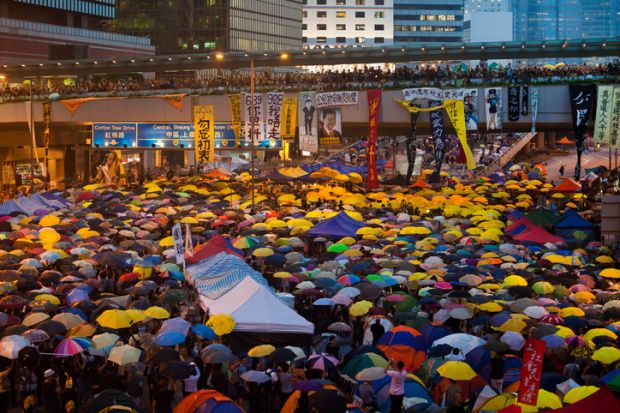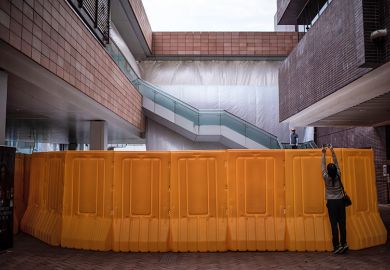Pledges by seven European national football teams to wear OneLove armbands in support of LGBT rights during the Qatar World Cup were comically abandoned as soon as FIFA threatened them with yellow cards. Rampant homophobia within men’s football aside, virtue signalling is a disease not confined to footballers. Human rights scholars are equally susceptible.
It is all very well to support a fashionable human rights cause, such as LGBT rights, when the battle has been all but won by scholars and activists who sacrificed their careers, liberty and lives. It is quite another to be willing to fight the battle in the first place.
Recently, a friend of mine, a Hong Kong human rights scholar, informed me he was to take up a senior lectureship in Australia. As I congratulated him, we discussed why he remained in Hong Kong after China imposed a national security law (NSL) on 30 June 2020, in breach of the 1984 Sino-British Joint Declaration and the Basic Law of Hong Kong.
He insisted it had nothing to do with money or status. In his view, academics who remained were the rare breed who cared, even if they were completely silent on matters such as human rights, international law and rule of law in Hong Kong as they navigated internal university purges of “incorrect” political stances and lived with ever-present anxieties that the NSL was meant to instil in everyone.
This is a scholar who felt compelled to write a newspaper column to condemn the one instance of police brutality during the Occupy Central movement in 2014. Like the vast majority of legal academics in Hong Kong, he kept mute throughout the teargas-filled months of pro-democracy protests in 2019 and 2020, and during sieges of two universities that rendered them akin to war zones. Legal academics in Hong Kong, he noted, were not accountable to me for any of their work.
Academics’ failures to resist totalitarian regimes are nothing new, of course. In their 2020 study of a German university under the Nazi regime, Dominic Detzen and Sebastian Hoffmann concluded that “academics responded to…accountability pressures, either by willingly demonstrating political commitment or by giving up their personal values and aligning ‘on the outside’. Only few dared to resist the Nazi rhetoric and symbolism in their teaching and research”.
However, resistance – in defending the rule of law at a minimum – is integral to the enterprise of legal scholarship and to its authority and legitimacy. Unlike most other subjects, the study of human rights, international law and rule of law requires far more than pure intellectual interest. As A. Belden Fields and Wolf-Dieter Narr highlighted in their 1992 paper “Human Rights as a Holistic Concept”, “if people are not aware…that human rights become realized only by the struggles of real people experiencing real instances of domination, then human rights are all too easily used as symbolic legitimizers for instruments of that very domination”.
Legal scholars do not get to say they stand with Ukraine while glossing over Hong Kong as if injustices were a buffet from which one could pick and choose on the basis of intellectual appetite or self-interest. Legal scholars do not get to hold states, governments and politicians accountable while regarding their actions (which include inactions) exempt from peer and public accountability.
With academic freedom comes academic responsibility. It is precisely when supporting a human rights cause might endanger one’s self-interest that doing so becomes not a career or intellectual choice but a moral duty. Cowardice, censorship and complicity go hand in hand, even at august universities.
It is entirely possible I was too harsh on my friend. I left Hong Kong two years ago. Unlike the many academics, lawyers, former legislators, journalists and human rights defenders now imprisoned in Hong Kong under the guise of law, I am no resistance fighter. I made a conscious choice to refuse to be an academic eunuch, even though it means I am unlikely to return to my homeland or see my family and friends there ever again. In defending the indefensible (or saying nothing, which amounts to the same), one makes an explicit choice to support a charade of a system actively engaged in rights repression and rule by law.
Might my friend finally feel free again to speak up for Hong Kong in Australia? I hope so – but I doubt it. Globally, human rights scholars have been almost universally silent about Hong Kong’s plight while pontificating about human rights violations by countries other than China. For them, those countries – and their academics – must be sanctioned. China, on the other hand, must be “engaged”, and academics in Hong Kong who have played an active part in its tragedy – they know who they are – are “old friends” and “research partners”.
At Western universities, speaking out about China carries such career repercussions that academics may well opt for “easier” causes – LGBT rights: why not? – given their employers’ heavy reliance on China’s “research donations” and international student fees. An informed legal scholar would also be aware that the NSL applies to every human being on Earth.
Ultimately, each of us makes a choice and has to live with it. We should, at the very least, stop lying to ourselves about who we are and what our moral compositions constitute. Freedom of conscience, after all. Per ardua ad astra!
Phil C. W. Chan is a London-based legal scholar and Human Rights Press Awards recipient, and formerly senior lecturer in public law and global governance at an Australian university.
Register to continue
Why register?
- Registration is free and only takes a moment
- Once registered, you can read 3 articles a month
- Sign up for our newsletter
Subscribe
Or subscribe for unlimited access to:
- Unlimited access to news, views, insights & reviews
- Digital editions
- Digital access to THE’s university and college rankings analysis
Already registered or a current subscriber? Login









